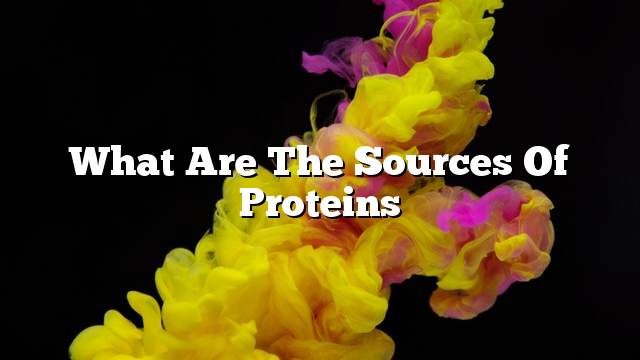Protein
Protein is a key element responsible for multiple functions in the body including building tissues, cells, and muscles. Protein with fat and carbohydrates is the main source of energy needed by the body to carry out vital processes. Protein consists of a group of twenty kinds of amino acids, of which nine are essential, that is to be obtained from protein-rich food sources, and other non-essential types which can be manufactured within the body
Sources of protein
Sources of protein are varied; some are animal, some are plant, including:
- Seafood and fish : Fish and seafood are one of the best sources of protein food, in addition to containing the acids omega 3 beneficial to the heart, unlike other sources of animal protein is rich in protein high nutritional value low fat.
- Meat of poultry : Is a good source of animal protein; where cut parts of chicken breasts without the skin of protein sources are low fat compared to red meat.
- Red meat : Red meat from protein-rich sources, as well as vitamins and minerals.
- eggs : Eggs are high-quality sources of protein, and are also a source of cheap animal protein. Eating eggs at breakfast helps reduce hunger for a long period of time.
- Milk and dairy products : Dairy products are rich in protein, and also contain calcium and vitamin D needed for bone building.
- Legumes : Pulses, such as beans, lentils, and chickpeas, are good sources of protein in food, as well as contain dietary fibers that help digestion and give a sense of fullness and satiety for a long period of time. One of the legumes contains a quantity of proteins equal to For those in an ounce of grilled meat.
- Soy : Soy milk and tofu cheese are a good alternative to other fat-rich proteins, as well as helping to lower cholesterol and reduce the risk of heart disease.
- Nuts : Almonds, hazelnuts, peanut butter, peanuts, pecans, sunflower seeds and walnuts are rich sources of beneficial fats as well as good protein content.
Protein Functions
Proteins are present in all tissues, forming part of every process that occurs in the body, and has many functions including:
- Antibodies are responsible for body immunity such as, amyuno globin.
- Enzymes responsible for chemical reactions in the body, such as: phenylalanine hydroxylase.
- Hormones are responsible for transmitting signals to cells and organs to motivate them to perform their functions.
- Involves the formation of cells and tissues, supports them and causes movement of muscles such as, actin protein.
- Contribute to the storage and release of vital molecules in the body such as fructin protein.
Daily needs of protein
The amount of protein needed per day depends on the individual’s weight and the type of physical activity he / she is doing. The healthy person advises the average activity to be 10-15% of the total daily calories of protein, Kilogram of body weight, while the pregnant woman needs about 10 grams or more, and the breastfeeding woman requires 20 grams of protein per day to be able to produce milk in sufficient quantities for the baby. Athletes need more protein to build muscle, and the amount of protein needed for them depends on the type of sports activity, duration and intensity of exercises.
Excessive intake of protein
Despite the great importance of proteins in the body, it should be treated moderately without exaggeration; some people rely on a diet rich in protein, and low in carbohydrates for several reasons, including: weight reduction, muscle building.
Medical studies have shown that eating large amounts of protein is harmful to the body, especially if this diet is not accompanied by regular exercise. The increase in the amount of proteins push the body to form toxic substances called ketones, and to get rid of ketones, the kidneys have to work an additional card, which exposes the body to the loss of large amounts of fluids and cause dryness of the body, and the stress of the kidney accompanied by the emergence of the following symptoms:
- Lack of calcium in the bones causing its fragility.
- Feeling tired and dizzy.
- There is a foul smell of the mouth.
- Increase the level of cholesterol in the blood, increasing the chances of heart disease.
- Increased chances of kidney stones.
- Gout: Eating large amounts of animal protein increases the production of boric acid, which accumulates in the joints causing severe pain.
- Increased risk of cancer: Studies indicate that eating animal protein in large quantities encourages the liver to produce growth factor similar to insulin, which in turn encourages the growth of cancer cells.
- Lack of muscle mass.
- Eating a diet high in protein low in carbohydrates leads to a lack of vitamins and fiber.
Protein Sensitivity
Some people suffer from the appearance of allergic symptoms when eating certain types of food, and one of the most common types of food allergy, protein sensitivity. Protein sensitivity is defined as an abnormal reaction of the body’s immune system to the protein found in certain foods, such as milk, eggs, peanuts, walnuts, and oysters.
Sensitivity occurs because proteins are not affected by the heat of cooking, or gastric acids and digestion enzymes, so they remain as they are without converting to amino acids, and are absorbed and enter the bloodstream in the form of proteins, reaching the various organs in the body, causing the spread of allergy throughout the body, Response of the immune system to the treatment of allergens by the production of antibodies, causing the emergence of symptoms of allergies, as follows:
Allergies are treated by avoiding the food they cause, the use of adrenaline in the event of an emergency, and treatments to relieve allergy symptoms such as antihistamines and bronchodilators.
